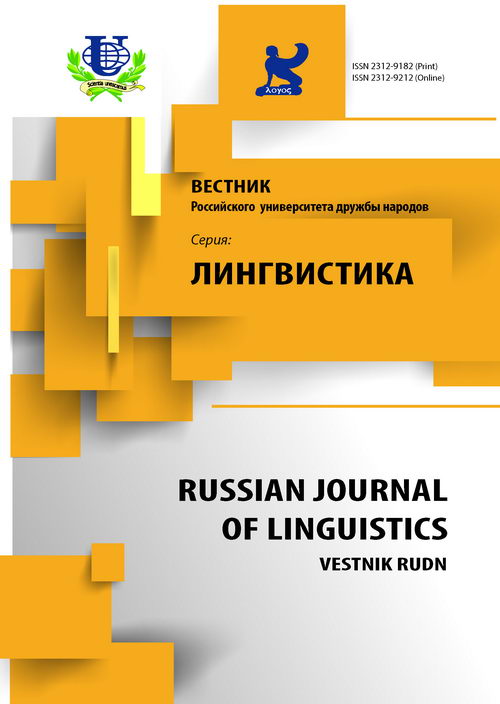Intercultural Communication and Disabilities from a Communication Complex Perspective
- Authors: Parrish-Sprowl J.1
-
Affiliations:
- Indiana University Purdue University Indianapolis
- Issue: Vol 19, No 4 (2015)
- Pages: 101-110
- Section: Articles
- URL: https://journals.rudn.ru/linguistics/article/view/9261
- ID: 9261
Cite item
Full Text
Abstract
Intercultural communication presents a number of challenges that are less of an issue in same-culture interactions. This is important because travel and technological capability enable more and more immigrants, business people, tourists, etc. to engage in such interactions. One group of people that comprises 10% of the world population, the disabled, is increasingly being mainstreamed within cultures as well as traveling to other countries. Research finds that the disabled are often marginalized and discriminated against within their own country. When the abled enter an intercultural interaction with the disabled the communication challenges are even greater. Communication Complex, a metatheoretical perspective on communication that embraces a constitutive definition of communication combined with a neuroscience understanding of interaction, offers a deeper, yet highly practical explanation of the level of complexity that such an encounter entails. This article offers a brief introduction to this way of understanding intercultural communication, along with the suggestion that future studies and practical guides should take disabilities into account when analyzing or building skills.
About the authors
John Parrish-Sprowl
Indiana University Purdue University Indianapolis
Email: johparri@iupui.edu
References
- Braithwaite, D.O. and Thompson, T.L. (1999). Handbook of communication and people with disabilities: Research and application. New York: Routledge.
- Cozolino, L. (2014). The neuroscience of human relationships: Attachment and the developing social brain. 2nd Edition. New York: W.W. Norton.
- Gonzalez, A. and Chen, Y-W (2015). In our voice: Essays in culture, ethnicity, and communication. 6th Ed. New York: Oxford University Press.
- Hasson, U., Ghazanfar, A.A., Galantucci, B., Garrod, S. and Keysers, C. (2012). Brain-to-brain coupling: A mechanism for creating and sharing a social world. Trends in cognitive sciences. 16 (2). 114-121.
- Luey, H.S., Glass, L. and Elliott, H. (1995). Hard-of-hearing or deaf: Issues of ears, language, culture, and identity. Social Work. 40, (2). 177-181.
- Parrish-Sprowl, J. (2014a). Communication complex. In T. Thompson (Ed.), Encyclopedia of health communication. (Vol. 3, pp. 211-213). Thousand Oaks, CA: SAGE Publications, Inc. doi: http://dx.doi.org/10.4135/9781483346427.n78.
- Parrish-Sprowl, J. (2014b). Making Change That Matters: A Story of Social Transformation and CMM. In S. Littlejohn and Sheila McNamee, Eds. The Coordinated Management of Meaning: A Festschrift in Honor of W. Barnett Pearce. New Jersey: Farleigh Dickenson University Press. p. 291-312.
- Parrish-Sprowl, J. (2013). Communication Complex: Achieving improved public health through greater coordination and collaboration. A world united against infectious diseases: Cross-Sectoral solutions: Proceedings of the Prince Mahidol Awards Conference. Bangkok, Thailand 263-266 (http://www.pmaconference.mahidol.ac.th).
- Parrish-Sprowl, J. (2012). Organizational performance: Moving from communication simple to communication complex. Organizational Consulting. (2) 38. p. 18-20.
- Parrish-Sprowl, J. (2009). The implications of globalization for applied communication research. In K. Cissna & L. Frey, Ed. Handbook of applied communication research. New York: Routledge. p. 257-279.
- Parrish-Sprowl, S. and Parrish-Sprowl, J. (2014). Suggestions for a Heuristic Turn in the Conversation on Posttraumatic Growth. Transformative Learning Conference Proceedings, Columbia University, New York. 787-792.
- Pearce, W.B. (2007). Making social worlds: a communication perspective. Malden, MA: Blackwell Pub.
- Prestowitz, C. (2005). Three billion new capitalists: The great shift of wealth and power to the east. New York: Basic Books.
- Sachs, J.D. (2005). The end of poverty: Economic possibilities for our times. New York: Penguin Press.
- Siegel, D.J. (2012). The developing mind: How relationships and the brain interact to shape who we are. 2nd Ed. New York: Guilford Press.
- Siegel, D.J. (2010). Mindsight: The new science of personal transformation. New York: Bantam Books.
- Ting-Toomey, S. and Chung, L.C. (2011). Understanding intercultural communication. New York: Oxford University Press.
- WHO (2006). Convention on the rights of persons with disabilities.
- http://www.un.org/disabilities/convention/questions.shtml.
- WHO (2006). Convention on the rights of persons with disabilities. http://www.un.org/ disabilities/convention/facts.shtml.
Supplementary files















